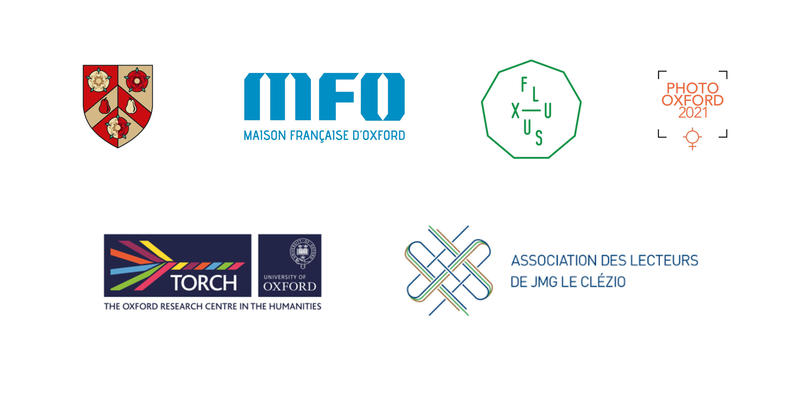Conference 'Women, Memory & Transmission. Postcolonial Perspectives from the Arts and Literature'
Similar Events
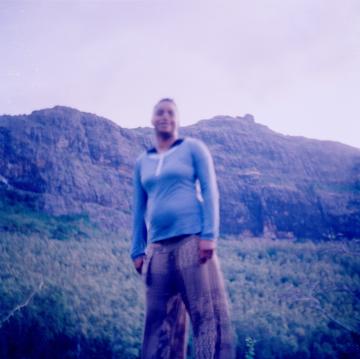
Convened by Justine Feyereisen and Elisa Moris Vai
The conference will take place at the Maison Française. To attend the event onsite, please register here https://www.eventbrite.co.uk/e/women-memory-transmission-tickets-186594799067
The public will be able to watch the event live on YouTube too https://youtu.be/mMpaezMGlO8
In collaboration with Photo Oxford Festival 2021, hosted by the Maison Française d’Oxford, and supported by the TORCH Humanities Cultural Programme, the international and interdisciplinary Conference “Women, Memory & Transmission: Postcolonial Perspectives from the Arts and Literature” will explore what it means for women to transmit memories in postcolonial contexts. What strategies do women develop to tackle postcolonial issues? What are the issues to address and the struggles to lead to be heard and valued as tellers of History? What ethical and political issues does the reception of their works raise? The conference will bring together art-world figures and scholars in the fields of gender studies, memory studies, postcolonial studies, and Global South studies to adequately contribute to show how the Humanities can lead to a better awareness of the key social and political role of women in reinterpretation of colonial History as acts of resistance and empowerment.
The conference will coincide with a photographic exhibition by Elisa Moris Vai, showcased during the 2021 Festival at the Maison Française d’Oxford (15 Oct. – 15 Nov.). The French photographic artist Elisa Moris Vai will present her series Catherine, Kiambé, Surya. The exhibition shows her photographic response to three female characters in La Quarantaine (1995) and Révolutions (2003), set in Mauritius, by Nobel Prize J.M.G. Le Clézio. The images closely intertwine fiction and reality, literature and photography, to better understand how the transmission of memory can be a tool of resistance and empowerment by women in postcolonial contexts.
Photograph from the series 'Catherine, Kiambé, Surya’ ©Elisa Moris Vai
9h - 9h15
Opening Act
Pascal Marty, Director of the Maison Française d’Oxford
Danielle Battigelli, Festival Director, Photo Oxford Festival
Justine Feyereisen and Elisa Moris Vai, Convenors
9h15 – 10h15
Panel #1 Renegotiating Identities
Mod. Justine Feyereisen (Ghent University)
Jasmine Togo Brisby
Antonia Wimbush (University of Liverpool), French Caribbean Writing: A Creole Feminine Identity
10h15 – 10h45
Interview by Pelumi Odubanjo with Ingrid Pollard
10h45 - 11h
Teatime and Exhibition
11h – 12h
Panel #2 Interrogating the Tropes
Mod. Elisa Moris Vai
Amanda Tavares (University of Sheffield), Passeuses de mémoire: Fluid and Fragmented Memories in Zineb Sedira’s Transmettre en Abyme
Mohini Chandra (Plymouth College of Art)
12h – 13h
Lunch break
13h - 13h30
Interview by Elisa Moris Vai with Heather Agyepong
13h30 - 15h
Panel #3 Resisting, Inventing, Empowering
Mod. Justine Feyereisen (Ghent University)
Kama La Mackerel, Interstices: Towards a Decolonial Trans Poetics of the Future
Deniz Gundogan Ibrisim (Sabancı University), The Poetics and Politics of Memory-Making and Cosmological Storytelling in Aminatta Forna and Phatsimo Sunstrum
Fabienne Viala (University of Warwick), Postmemory and Female Transmissions in Caribbean Performative Arts
15h - 16h
Keynote Speech
Mod. Justine Feyereisen and Elisa Moris Vai
Deborah Willis (New York University – Tisch School of the Arts)
16h - 16h15
Teatime and Exhibition
16h15 - 17h45
Panel #4 Memory-Making: From Personal to Political
Mod. Coraline Jortay (Queen’s College, Oxford)
Erika Tan (University of the Arts London), My Mother Told Me/STUFF
Emma Parker (Keele University), Collages, Photographs and Colonialism in Contemporary Life Writing
Jenni Ramone (Nottingham Trent University), Looking Back to Move Forwards: Memories of Books and Reading in Anita Desai’s Clear Light of Day (1980) and Zadie Smith’s Swing Time (2016)
17h45 - 18h
Close
Justine Feyereisen and Elisa Moris Vai
Contact Information:
Justine Feyereisen, jfeyerei@gmail.com
Elisa Moris Vai, elisa@elisamorisvai.com

Deborah Willis, New York University - Tisch School of the Arts
Deborah Willis, PhD, is University Professor and Chair of the Department of Photography & Imaging at the Tisch School of the Arts at New York University. She is the recipient of the MacArthur Fellowship, a Guggenheim Fellowship and a member of the American Academy of Arts & Sciences. She is the author of The Black Civil War Soldier: A Visual History of Conflict and Citizenship and Posing Beauty: African American Images from the 1890s to the Present, among others. Professor Willis’s curated exhibitions include: "Framing Moments in the KIA," "Migrations and Meanings in Art", "Let Your Motto Be Resistance: African American Portraits” at the International Center of Photography; Out of Fashion Photography; Framing Beauty at the Henry Art Gallery and "Reframing Beauty: Intimate Moments" at Indiana University.
Website: http://www.debwillisphoto.com

Deniz Gundogan Ibrisim, Sabancı University, The Poetics and Politics of Memory-making and Cosmological Storytelling in Aminatta Forna and Phatsimo Sunstrum
Deniz Gundogan Ibrisim received her PhD in Comparative Literature from Washington University in St. Louis. She specializes in literary trauma and memory studies, postcolonial studies, ecofeminism, posthumanism, environmental humanities, Middle East, and African studies. Gundogan Ibrisim has been awarded Marie Skłodowska-Curie Postdoctoral Fellowship within the EU Horizon 2020 research program and is currently working as a Marie Curie Postdoctoral Fellow at the Gender and Women's Studies Center of Excellence (SU Gender) at Sabancı University, Faculty of Arts & Social Sciences.
In this paper I take Nobel laureate Wole Soyinka’s scholarship on African animist cosmologies as my departure point for interpreting women mobilizing Anglophone African memory. Soyinka’s scholarship underscores the way animist cosmologies expand personhood beyond the individual, the rational and the bounded human subject. At the same time, it productively offers an alternative look into Cartesian dualism with a cosmologically informed (trans)subject and animist personhood. In another words, for Soyinka, animist personhood assumes a cyclic temporal structure, which is ritually sustained by the vibrant interconnections between the past, present, and future as well as by the entangled worlds of the dead, the living, and the unborn. I utilize this cosmic-temporal continuum to analyze how women in contemporary art and literature imagine traumatic memory beyond the pathological closures. To that end, I analyze the Scottish and Sierra Leonean writer Aminata Forna’s novel Ancestor Stones along with the South African artist and designer Pamela Phatsimo Sunstrum’s works to foster a comparative dialogue on the creation of alternative histories that can reconfigure painful pasts and presents. Giving voice to silenced memories and reclaiming collective memories that have been misrepresented in official narratives, both Forna and Phatsimo Sunstrum question the poetics and politics of memory-making in relation to experiences of vulnerability and violence.
Set in a fictional west African location most resembling Sierra Leone, Ancestor Stones is made up of multilayered stories narrated through the voices of four women in the Kholifa family: Asana, Mariama, Hawa, and Serah, and so begins the gathering of the family and the country’s turbulent and traumatic history- from colonialism to independence and the horrors of The Sierra Leone Civil War (1991–2002). Violence, loss, and trauma are common threads running through the novel and all the women are subject to the hierarchies of the polygamous family structure, which, to be sure, works for against them, and destroy their lives in many ways in the face of the political violence. And yet, women characters work through their loss and trauma from a local, spiritual and what I call cosmological storytelling. The characters, I argue, develop their unique memory practices and storytelling through cosmological and animist perspective. In Phatsimo Sunstrum’s paintings, one could see rough multilayered representations that merge vibrant female figures with fantastical and animist landscapes, forging more complex and nuanced portrayals of black women. This paper argues that both Forna’s and Phatsimo Sunstrum’s creative engagement foregrounds “cosmological storytelling,” which is indeed a conscious strategy for women in mobilizing memories of violence in postcolonial contexts. In this way, both women resist the erasure of past violence from current memory and engender new visions for future generations.
Contact: deniz@wustl.edu
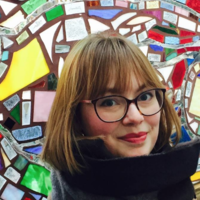
Emma Parker, Keele University, Collages, Photographs and Colonialism in Contemporary Life Writing
Emma Parker is a lecturer in postcolonial literature at Keele University. Between 2020-2022 she is also a researcher at the Oxford Centre for Life Writing. She has previously published articles on autobiography, colonialism, and graphic narratives in Critical Quarterly, Life Writing, Auto/Biography Studies, and Wasafiri. Her co-edited collection British Culture After Empire is due to be published by Manchester University Press in 2022.
In her 2019 memoir Imperial Intimacies, Hazel V. Carby recounts being a Black British child who dreaded ‘The Question’: ‘‘Where are you from… but where did you come from before that?’ Explanations that she was born in England to a Jamaican father and a Welsh mother prompted her interrogators, from classmates to teachers, to reply that the young Carby was a liar. Such acts of refusal deliberately dismissed her claims to belonging in the post-imperial nation. As the historian David Olusoga writes in his own autobiographical reflections, growing up in a post-war era at the end of empire, meant that for Black and mixed race children ‘while it was possible to be in Britain, it was much harder to be of Britain’ (2016, xvii). As this paper notes, a recent proliferation of Jamaican-British life writing – including Stuart Hall’s Familiar Stranger (2017) and numerous works by Colin Grant – reveal that Carby’s memoir is both situated within a wider body of contemporary life writing, and expands the established forms and thematic interests of this sub-genre.
In this paper I explore how Carby’s explorations of her family’s past in Imperial Intimacies critically interrogates the entangled histories of migration and the collapse of empire in the UK. I suggest that, by developing a formally complex auto/biographical narrative that borrows techniques of the visual collage, Carby knits together a multi-modal auto/biographical form. In so doing she combines colonial history, personal narrative and biographical reconstruction. In so doing she calls into question the national, boundaried story of Britain as a singular or exemplary island nation (a myth that has further calcified in the aftermath of Brexit). By drawing on theories of photography and autobiography advanced by Annette Kuhn, I trace how the combinations of text and image in Imperial Intimacies map a constellation of transnational lives, interrogate the possibilities of national belonging, and advance the generic boundaries of the family memoir.
Contact: e.parker@keele.ac.uk

Jenni Ramone, Nottingham Trent University, Looking Back to Move Forwards: Memories of Books and Reading in Anita Desai’s Clear Light of Day (1980) and Zadie Smith’s Swing Time (2016)
Jenni Ramone is Associate Professor of Postcolonial and Global Literatures and a director of the Postcolonial Studies Centre at NTU. Her recent publications include Postcolonial Literatures in the Local Literary Marketplace: Located Reading, The Bloomsbury Introduction to Postcolonial Writing, Postcolonial Theories, and Salman Rushdie and Translation. She is currently undertaking new projects on Global Literature and Gender, and on literature and maternity. She is an Associate Editor for JPW and Treasurer of the PSA.
This paper considers how narrative methods adopted in two contemporary texts enable women’s postcolonial retelling of history, while they stage women who forego or reject conventional maternal roles. Both texts involve representations of literary texts and reading, and memories of reading. Zadie Smith in Swing Time (2016) employs the Black Consciousness principle of Sankofa, looking backwards to move forwards, to consider the contemporary impact of the Black Atlantic, particularly through transnational adoption. In Clear Light of Day (1980), Anita Desai represents methods to move through the trauma of Indian Partition via memories of reading.
Contact: jenni.ramone@ntu.ac.uk

Amanda Tavares, University of Sheffield, Passeuses de mémoire: fluid and fragmented
memories in Zineb Sedira’s Transmettre en Abyme
Amanda Tavares is a PhD student at the University of Sheffield. Her thesis explores visualisations of the Mediterranean as a geographical, conceptual and poetic space in the work of seven contemporary women artists. She is particularly interested in how installation artworks can renegotiate historical visual tropes and create spaces for reflection and engagement.
This paper proposes an in-depth analysis of Transmettre en Abyme (2012), a three-screen video installation by contemporary artist Zineb Sedira. Focused on conversations between the artist and gallery director Hélène Detaille, this artwork explores acts of curation, organisation and preservation of photographic archival images, mainly those of boats and ships in the port of Marseille taken and bought by a mysterious male photographer between 1935 and 1985.
Articulating the idea of women as passeuses de mémoire and the artwork’s title neologism of mise en abyme, this paper will analyse the artist’s and the gallery director’s role in creating, maintaining and disseminating the memories intertwined with this photographic archive. It will explore the conceptual gaps and material challenges faced by Hélène, in particular around the space, time, knowledge and care needed to make sense of the photographs, in order to point out the archive’s fragilities and its impacts on the (re)construction of memories of the port of Marseille. This paper will also examine how Sedira’s filmic practice creates a new archival form of the archive itself, allowing her to link apparently disjointed testimonies and historical episodes and mobilise strong colonial tropes such as the ship and the abyss. By making audiences consider copies and fragments of images as essential, constitutive parts of the process of writing histories, Sedira opens a space where historical narratives can be constantly revisited, represented and reimagined and where memory is conceptualised as always in flux.
Contact: atavares1@sheffield.ac.uk

Alan Rice (University of Central Lancashire, Preston), Jade Montserrat: Muscle Memory: Visualising Black Presence in North British Rural Spaces
This paper explores the multivarious works of the emerging Black British artist Jade Montserrat across video art, watercolours and performance art. It especially engages with the way her work responds to the specific landscape of North Yorkshire and with the historical presence of black people in rural and Northern spaces. It will delve into theoretical work by Edouard Glissant, Stuart Hall, Michael Rothberg, Hanna Arendt, Paul Ricœur and Ian Baucom and the lessons of a previous generation of black women artists to assess its complex and multidirectional interventions and meanings.
Alan Rice is Professor in English and American Studies at the University of Central Lancashire, Preston, co-director of the Institute for Black Atlantic Research (IBAR) and director of the UCLan Lancashire Research Centre in Migration, Diaspora and Exile (MIDEX). He has worked on the interdisciplinary study of the Black Atlantic publishing Radical Narratives of the Black Atlantic (2003) & Creating Memorials, Building Identities: The Politics of Memory in the Black Atlantic (2010). He was a founder member of the Slave Trade Arts Memorial Project in Lancaster which was responsible for unveiling a memorial commemorating victims of the slave trade in 2005, co-curated Trade and Empire: Remembering Slavery at the Whitworth Gallery Manchester in 2007 and has been consultant and talking head on a variety of documentaries with the BBC and other broadcasters. He has given keynote presentations in Britain, Germany, Switzerland, Greece, the United States, Italy, Denmark, Spain, Poland, the Netherlands and France His articles have appeared in a wide range of journals including, Slavery and Abolition, Atlantic Studies, Patterns of Prejudice, Journal of American Studies Zeitschrift fur Anglistik und Amerikanistik and Research in African Literatures. His latest co-written work, Inside the Invisible: Memorialising Slavery and Freedom in the Life and Works of Lubaina Himid (2019) is the first academic monograph on the 2017 Turner Prize Winner. In 2021 he is curating the exhibition ‘Lubaina Himid: Memorial to Zong’ for the Lancaster Maritime Museum and working on projects with Preston Black History Group, Sewing Café, Lancaster and Lancaster Jazz Festival.

Antonia Wimbush, University of Liverpool, French Caribbean Writing: A Creole Feminine Identity
Antonia Wimbush joined the department in October 2020 to take up a Leverhulme Early Career Fellowship, under the mentorship of Prof. Charles Forsdick. Her project is entitled ‘Representing the BUMIDOM: French Caribbean Migration in Literature and Culture’. She completed her PhD at the University of Birmingham in February 2018. Her thesis examined themes of exile and migration in life writing written by women writers from across the Francophone postcolonial world and was fully funded by the Midlands3Cities Doctoral Training Partnership. Her first monograph, Autofiction: A Francophone Aesthetic of Exile, was published by Liverpool University Press (2021). In addition to her research expertise in exile and migration, she is interested in questions of gender, sexuality, and bodily experiences. She co-edited a special issue of L’Esprit Créateur with Dr Polly Galis and Dr Maria Tomlinson, entitled ‘Challenging Normative Spaces and Gazes: Imagining the Body in the Francophone World’. This special issue, which was published in June 2020. They are also publishing Queer(ying) Bodily Norms in Francophone Culture with Peter Lang in 2021, an edited volume which investigates questions of gender and sexuality in Francophone contexts. Recent publications include an article for Journal of Romance Studies on literary representations of World War Two in Caribbean women’s writing and a book chapter which offers an ecocritical account of Véronique Tadjo’s latest novel, published in Transgression(s) in Twenty-First-Century Women’s Writing in French (2020). From 2016 to 2019 she was the Conference Secretary for the Society for Francophone Postcolonial Studies. She is currently co-editing a special issue of Francosphères entitled ‘Postcolonial Realms of Memory in the Francophone World’.
This paper explores the complex dynamics of Creole language and culture in the French Caribbean, and interrogates how gender issues come to bear on language and identity in the region. Since the publication of the literary manifesto Éloge de la Créolité by Jean Bernabé, Patrick Chamoiseau, and Raphaël Confiant in 1989, there has been a concerted effort in Guadeloupe and Martinique to celebrate Creole identity through language, literature, music, gastronomy, and visual culture. However, the Créolité movement has also been criticized by Caribbean scholars, writers, and thinkers for its nostalgic remembering of the past and for its silence on the question of gender. Examining this gendered blind spot further, this paper argues that women writers such as Suzanne Dracius (Martinique), Maryse Condé (Guadeloupe), and Gisèle Pineau (Guadeloupe) create their own form of Creoleness through their hybrid writing which is more inclusive of female experiences of Creole identity.
Contact: Antonia.Wimbush@liverpool.ac.uk

Erika Tan https://www.erikatan.net/ (London)
Image credit: My Mother Told Me/Barang-Barang/Speaking about my mother
Erika Tan is an artist, curator and researcher whose work focuses on the postcolonial, transnational and decolonial - working with archival artefacts, exhibition histories, received narratives, contested heritage, subjugated voices and the transnational movement of ideas, people and objects. Tan is currently The Stanley Picker Fine Art Fellow. Her work has been exhibited & collected internationally. Current projects include: Art Histories of a Forever War—Modernism Between Space and Home, Taipei Fine Art Museum; ESOK, Jakarta Biennial, Indonesia; Frequencies of Tradition, Incheon Art Platform, Korea; In/reproduction: The 4th Global Overseas Chinese Artists Exhibition, He Xiangning Art Museum, Shenzhen China; Barang-Barang, Stanley Picker Fellowship exhibition, Kingston School of Art; "Asian Heads” Dorich House Museum, London.
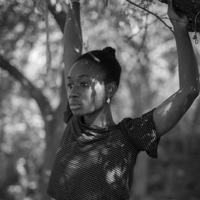
Heather Agyepong http://www.heatheragyepong.com/
Image credit L Joseph Lynn, 2021
Heather Agyepong is a visual artist, performer/actor and maker who lives and works in London. Her art practice is concerned with mental health and wellbeing, invisibility, the diaspora and the archive. She uses both lens-based practices and performance with an aim to culminate a cathartic experience for both myself and the viewer. She adopts the technique of re-imagination to engage with communities of interest and the self as a central focus within the image. Heather has worked within photographic & performance arts since 2009 with a range of works that have been published, performed and exhibited around the UK and internationally. She has been nominated for Prix Pictet & Paul Huf Award in both 2016, 2018 & 2021. Heather Agyepong's work exists in a number of collections including Autograph ABP, Hyman Collection, New Orleans Museum of Art and Mead Art Museum. She has been commissioned by a number of organisations including the Mayor of London, Photoworks, Artichoke & Tate Exchange. In her television/film and theatre work, she is drawn to challenging and compelling writing with an intrigue for unique voices. Heather has previously been an associate artist of black led theatre company Talawa and continue to perform both nationally & internationally. She was nominated for the South Bank Sky Arts Breakthrough Award 2018, awarded the Firecracker Photographic Grant 2020 and have recently been selected as part of Foam Talent 2021. Heather has just been announced as one of the two recipients of the Jerwood/Photoworks Awards 4 for 2022
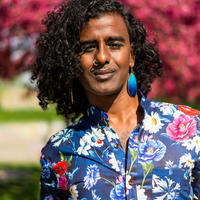
Kama La Mackerel https://lamackerel.net/ // @KamaLaMackerel
Image credit Noire Mouliom
Kama La Mackerel is an award-winning Mauritian-Canadian multi-disciplinary artist, educator, writer, curator and literary translator who works within and across performance, photography, installations, textiles, digital art and literature. Kama’s work is grounded in the exploration of justice, love, healing, decoloniality, hybridity, cosmopolitanism, ancestral healing and self- and collective-empowerment. They believe that aesthetic practices have the power to build resilience and act as resistance to the status quo, thereby enacting an anticolonial praxis through cultural production.
They are the author ZOM-FAM (Metonymy Press) which was named a CBC Best Poetry Book, a Globe and Mail Best Debut, and was a finalist for the QWF Concordia University First Book Award and the Writers' Trust of Canada Dayne Ogilvie Prize. World Literature Today called ZOM-FAM “a milestone in Mauritian literature."
Kama has exhibited, performed and lectured internationally and their writing in English, French and Kreol has appeared in publications both online and in print. In 2021, Kama was awarded the Canada Council for the Arts Joseph S. Stauffer Prize for emerging and mid-career artists in Visual Arts.
In 2021, Kama presented their new multimedia exhibition Queering the Is/land Body at La Galerie de l’UQAM as part of MOMENTA, Biennale de l’image.
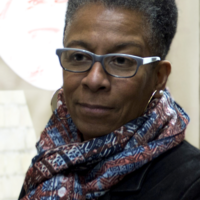
Ingrid Pollard http://www.ingridpollard.com/
Mixed-media artist and researcher, Ingrid Pollard uses digital, analogue and alternative photographic processes, also incorporating printmaking, image-text video and audio. Pollard studied Film and Video at the London College of Printing and MA in Photographic Studies, University of Derby and holds a PhD from the University of Westminster.
She was one of twenty founding members of Autograph ABP, and is an Honorary Fellow of the Royal Photographic Society. In 2018, Pollard was the Inaugural Stuart Hall Research Fellow in the same year. She has worked as an artist-in-residence at a number of organisations, including Project Row Houses, Houston Texas, US; the Lea Valley and Cumbria National Parks. Her work has been exhibited widely, including Tate Britain, Victoria & Albert Museum & Photographers Gallery, London; NGBK, Berlin; the Caribbean Cultural Centre, New York; the National Art Gallery of Barbados; and Camerawork, San Francisco. In 2019, she received the BALTIC Artist Award and was a recipient of the Paul Hamlyn Foundation Award and Freelands Artist Award in 2020 with MK gallery.
Ingrid is Research Professor at Northumbria University.

Jasmine Togo-Brisby
Jasmine is a multidisciplinary artist originally from Queensland Australia now based in Wellington New Zealand. Through her research driven practice she examines the historical practice of 'blackbirding', a romanticised colloquialism for the Pacific slave trade, and its contemporary legacy and impact upon those who trace their roots through the slave-diaspora. Togo-Brisby delves into her own personal history and that of the Pacific slave trade, which saw her great-great-grandparents taken from Vanuatu and transported to Australia in 1899 under slave-labour policies employed by the Australian government.
As a fourth-generation Australian South Sea Islander her works address the complexities of contemporary South Sea culture and identity. Her practice encompasses painting, lens based media, sculpture and installation and regularly incorporates three generations - her mother, daughter, and herself – making visible the often invisible but enduring effects of intergenerational trauma.
Togo-Brisby studied fine arts at Queensland College of Art and holds a MFA from Massey University of New Zealand, she has exhibited extensively throughout Australasia and abroad and her works are held in private and institutional collections internationally.

Mohini Chandra http://www.mohinichandra.com/
Mohini Chandra is an artist whose work deals with articulations of identity and globalized spaces, and the role of the photographic in relation to memory and migration. As a child, Chandra spent time in Fiji and travelled widely with her family within the Indian-Fijian diaspora. She has an interest in photographic histories and the processes of visual culture within colonial, anthropological and ethnographic discourses and the imagery of contemporary globalized cultures. Having previously worked across the Asia-Pacific region in search of diasporic narratives, her recent project Paradise Lost examines the complexities of colonial seafaring, slavery and indenture, through the archaeology of shipwrecks.
Since graduating from the Royal College of Art, Chandra has exhibited widely, including in: Paradise Now? Contemporary Art from the Pacific, Asia Society Museum, New York; Out of India, Queens Museum of Art, New York; 000ZeroZeroZero, Whitechapel Art Gallery, London; Artist and the Archive, Shoreditch Biennale; the First Johannesburg Biennale and the Photography Triennial - Dislocations, Rovaniemi Museum in Finland. She has had solo shows at venues such as the Southeast Museum of Photography, Florida and the Bluecoat Gallery, Liverpool. She has shown in Photo Kathmandu (2015), CCP Declares at the Centre for Contemporary Photography, Melbourne (2016), Now! Now! In more than one place, Chelsea College of Arts-University of the Arts London (2016), the Focus Festival of Photography in Mumbai, (2017), the Third Oceanic Performance Biennale in Auckland (2017), the Houston FotoFest Biennial (2018), Unquiet Moments, Courtauld Institute, (2020), Bittersweet, Casula Powerhouse Museum, Sydney, (2020) and Care Contagion, Other, Autograph, London (2021). Her solo exhibition Paradise Lost is at MIRROR in Plymouth in 2021 and will tour to the Chennai Biennale in 2021-22.
Her work is held in international collections in the UK and USA including the UK's Arts Council Collection and included in major survey publications such as Phaidon's Art and Photography (ed. David Campany) and Bloomsbury’s Photography in India in Light Years and Digital Times,(ed. Aileen Blaney & Chinar Shah), 2021. Mohini Chandra has recently been awarded an Arts Council/National Lottery Grant for Paradise Lost and has previously been supported by the Australia Council, Asialink and Arts NSW as well as the Arts and Humanities Research Council, and the British Council. Autograph awarded her a new commission for Belated in 2021 and most recently she was awarded the 2021 Arts Institute Film Commission with the Box Museum for Tall Tales and Wonder Rooms.

Dr Justine Feyereisen is currently a FWO Senior Postdoctoral Research Fellow at Ghent University (BE) where she is conducting a project in French and Francophone Studies entitled “Reimagining Migration Narratives with Ecopoetical Postcolonial Perspectives in Transatlantic Francophone Literature (Caribbean Archipelago, Metropolitan France and Sub-Saharan Africa, 1999-present)”. She is affiliated with Wolfson College (Oxford) and Maison Française d’Oxford. Since 2016, she is a non-tenured Assistant Professor of French and Francophone Studies at the Université libre de Bruxelles, after a FNRS PhD Fellowship at the Université libre de Bruxelles and the Université Grenoble Alpes, and a Fulbright Postdoctoral Fellowship at the University of California, Berkeley. Her research also led her to Wolfson College (University of Oxford) as a Wiener-Anspach Junior Research Fellow (2019-2021). Her research interests and expertise include 20th-21st Literature in French, postcolonial and decolonization literature, utopian fictions and sustainability, international migrations, body and senses, memory and postmemory, spatial studies, gender studies, photography and text intermediality, ecopoetics and ecofeminism. She is President of the Association des lecteurs de J.-M.G. Le Clézio.

Elisa Moris Vai is a french emerging artist based in Lille (FR) working with lens-based media, who produce research-driven work. Her practice is characterized by the inventive use of performative strategies and the intersection of documentary and fiction. History, memory, and social representations are at the core of her work, with a current focus on french colonisation. She was awarded the Panel’s choice of the Photo Oxford Open Call 2020 and shortlisted for the Open 20 Solo Award of Photofringe festival, Brighton.
Moris Vai’s work has been shown in venues across Europe (Noorderlicht Festival (NL), Photofringe festival (UK), Ovada Gallery (Oxford, UK), and Les Passerelles art center, Pontaut-Combault (FR)). Her first solo show, curated by Pelumi Odubanjo, supported by Fluxus Art Projects and Torch as part of the Humanities Cultural Programme, will be presented at Maison Française, Oxford, from 15/10 to 15/11 2021. Her profile has been featured in Photomonitor and The Guardian.
Moris Vai extends her art practice to curating conferences relating to the themes she explores. During the last year, she worked in the UK with Photofringe Festival and Grain Photography Hub.
She has a MA in Performing Arts (Free University of Brussels / Free University of Berlin) and a BA in Photography (EFET School of Photography, Paris).

Coraline Jortay (The Queen's College, University of Oxford)
Dr Coraline Jortay is a Laming Junior Research Fellow at the Queen’s College, University of Oxford. Her area of expertise is the history of literary translation into Chinese at the turn of the twentieth century, with a focus on its impact on language reform. In particular, her first monograph project explores the debates surrounding gender equality that rocked the Chinese intellectual and literary scenes after gendered pronouns were introduced into modern vernacular Chinese through literary translation in the late 1910s. She is also a published translator of contemporary Sinophone literature into French, with a taste for poetry and short fiction.

Pelumi Odubanjo, curator
Pelumi Odubanjo is a London-based multidisciplinary artist, curator, writer, and researcher. Interested in contemporary vernaculars around image-making, her work is informed by a decolonial black feminist epistemology. Pelumi works with artists, archives, and cultural artefacts to create and explore dialogues across a global African diaspora and unravel historical and contemporary links between the intersectionality of women, migration, and identity as means to disentangle our understandings of archival practice. Pelumi is co-founder of Contakt Collective, a collective of Goldsmith’s University of London postgraduate researchers examining the intersections of power, care, spatiality, & visual culture. Pelumi holds a BA from Newcastle University in Fine Art and Art History, and an MA in Contemporary Art Theory from the Visual Cultures Department at Goldsmiths, University of London. Her writing on contemporary photography, art, and culture has appeared on Magnum Photos, Artillery Magazine, Photoworks UK, and Photo Fringe amongst others. Her most recent projects include curating and producing for the Tate Exchange at Tate Modern, working as a curator at the Black Cultural Archives, and curating for Brighton Photo Fringe.
Website: https://pelumiodubanjo.com
